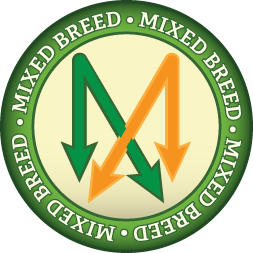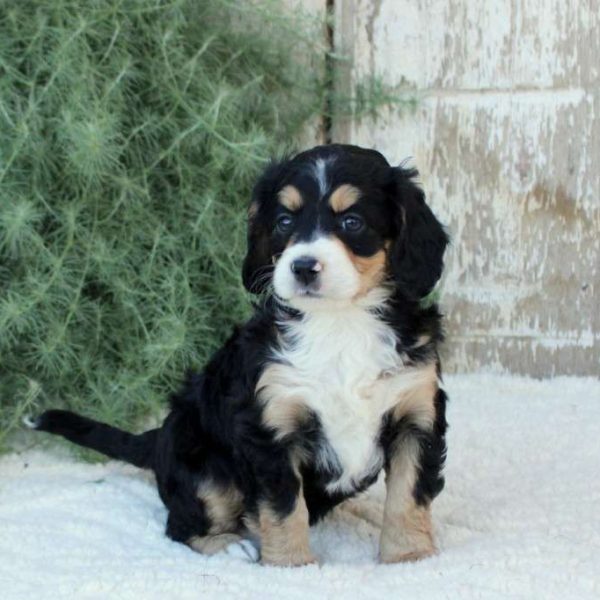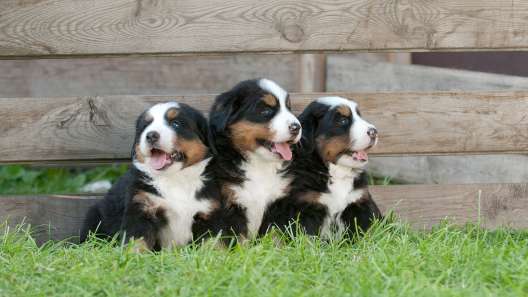
-
Activity Level:
moderate
-
Shedding Level:
moderate
-
Grooming Level:
moderate
-
Trainability:
high
- Good for Novice Owners: moderate
-
Adaptability:
moderate
-
Kid/Pet Friendly:
often
-
Prey Drive:
high
-
Watchdog:
aware
- Average Size: Large
- Average Lifespan: 6-8 years
Bernese Mountain Dog Mix Dog Breed Information
Overview
Temperament
Adaptability
Health
Owner Experience
Grooming
Activity Level
Size
Life Span
The Bernese Mountain Dog Mix is a cross between a Bernese Mountain Dog and another dog breed. Should they take after their Bernese Mountain Dog parent, they will be a large, fluffy, energetic, playful, and friendly dog that makes a great family pet.
But, you do want to talk to the breeder about the other dog breed in the mix. Because a mixed-breed dog can inherit any combination of traits from one or both parents, the other parent breed will introduce some other potential traits into the mix and you will want to be aware of what those are.
Bernese Mountain Dogs are known for their large, fluffy appearances and their friendly, affectionate personalities. They get along well with children, other pets, and other people. They can have a high prey drive, so they may need some extra socialization with other smaller pets in the household.
As long as the other parent breed doesn’t throw any potential curveballs when it comes to temperament, you should be able to expect a similar temperament in a Bernese Mountain Dog Mix. Talking to the breeder about the other parent breed and meeting the mother dog can give you an idea of potential temperament. But, once you get a puppy home, continued training and socialization are up to you.
The Bernese Mountain Dog is a moderately adaptable dog. They don’t like spending long periods of time alone. As long as an apartment can handle their large size and they still get plenty of exercise, they can adapt to apartment living even though they are better suited to larger homes with yards.
The other parent breed in the mix could result in a Bernese Mountain Dog Mix that is more or less adaptable than the Berner parent. So, you do want to talk to the breeder about the other parent breed to get an idea of what potential range to expect.
Are mixed-breed dogs healthier than established breeds? They can be, but it’s not a guarantee. A mix can inherit the potential health conditions common to one, both, or neither of their parent breeds.
On the Bernese Mountain Dog side, potential health concerns to be aware of include elbow dysplasia and hip dysplasia. As a large dog breed, they are also more prone to bloat. Bloat in dogs can become dangerous quickly, so you do want to know how to prevent it as well as the symptoms so you know when to get help.
Reputable breeders will screen their stock to avoid passing issues on to puppies. So, you want to make sure you talk to the breeder about the other parent breed as well as the health and genetic history of both of the parent breeds.
Berners are highly trainable dogs. They are intelligent and eager to please their owners, so they tend to be a good fit for owners of any experience level. But, they are a working breed with a lot of energy, which can be challenging for first-time dog owners.
If the other parent breed is similar when it comes to training, then you can expect the same in a Bernese Mountain Dog Mix. If not, then you will want to be prepared for a dog that may be more difficult to train. Puppy training classes can be a big help and they also often offer opportunities to socialize a puppy.
A mix can inherit a coat that is similar to one of the parent breeds or a true combination of both. If they inherit the Berner coat, a Bernese Mountain Dog Mix will have a thick, fluffy double coat that will shed year-round and heavier during seasonal changes. Brushing a few times a week, daily during seasonal shedding, and bathing as needed is enough to keep a Berner coat looking great.
Regardless of coat type, you will need to take care of your Bernese Mountain Dog Mix’s nails, ears, and teeth. Monthly nail trims are usually sufficient to keep nails from growing too long. But, you may need to cut your dog’s nails more often if they grow quickly or aren’t wearing down as much naturally.
Weekly ear checks and carefully cleaning your dog’s ears as needed can help prevent ear infections. You want to make sure ears are dry, clean, and free of debris and pests. If you see something concerning, then you know it’s time to get to the vet.
It’s also important to start and stick to a consistent dental care routine. Due to a lack of good dental care for dogs, gum disease is one of the most common health issues in dogs. Instead of overlooking this, brush your dog’s teeth or use an enzyme toothpaste every day. This will help prevent painful dental diseases later in life.
Although they are a working breed, Bernese Mountain Dogs are not a high-energy breed. They have a more moderate activity level. They do need daily walks plus playtime or extra activity to be happy, but they will tire themselves out and won’t run you ragged. But, when they play, they play hard and tend to keep things up until they are tired.
This can result in some intense play sessions, so you will want to be prepared for some bursts of high energy. The other parent breed in the mix could result in a lower or higher activity level. Talking to the breeder about the other parent breed can give you a better idea of what range to expect in a Bernese Mountain Dog Mix.
A Bernese Mountain Dog is a large dog breed that stands about 23-28 inches tall and weighs 80-110 pounds when they are fully-grown. The other parent breed can affect this, so you do want to talk to the breeder about them. Although it is not a guarantee, you can also meet the mother dog in-person to see around what size to expect in a fully-grown Berner Mix.
Bernese Mountain Dogs tend to live for 6-8 years. Although the other parent breed may affect this slightly, you can likely expect something similar in a Bernese Mountain Dog Mix.









